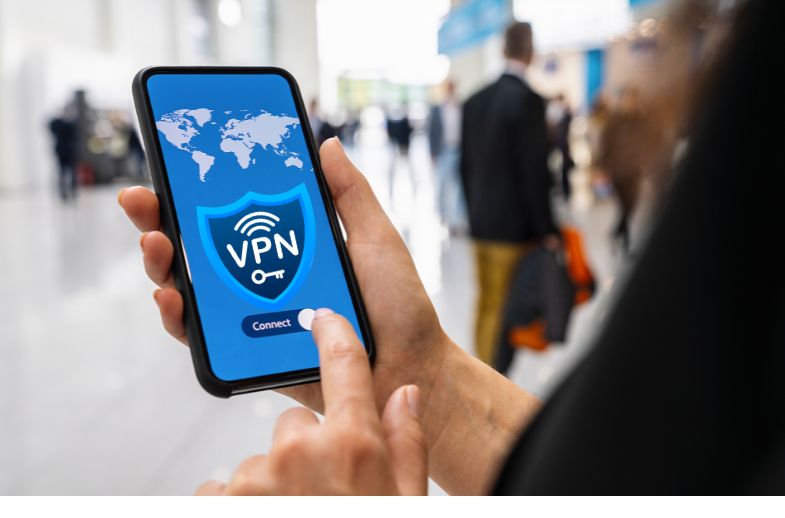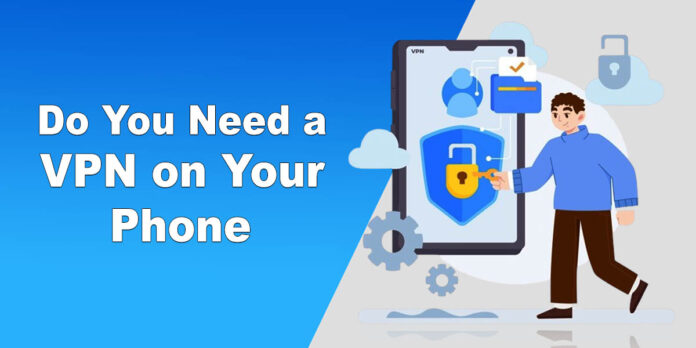The modern smartphone is like an extra limb for many, conveniently integrated into our lives. With so much data in our pockets, protecting it must be a priority.
Sometimes, many of us use public WiFi daily when we are out, and in this case, mobile security becomes a concern. The solution for most is the use of a VPN. In a survey, 50% of respondents reported using a VPN for public Wi-Fi.
For those who aren’t already using a VPN, let’s discuss what it is, the benefits, and the drawbacks so that you can evaluate whether or not you should be using one.
Evaluating VPNs For Mobile Security
The average smartphone user has more than 80 applications on their phone, bringing a variety of mobile security risks.
A Virtual Private Network works by using one or more secure protocols to find and maintain a secure connection for your device on the internet.
The advantages of using a VPN are great; however, each of its benefits must be carefully considered against the potential drawbacks if you want to know whether or not you really need one.

A VPN’s Benefits on Mobile Devices
There are 3 main benefits for your mobile device that can be provided by a VPN.
- Privacy and Anonymity: The IP address you are usually defined by is masked when you use a VPN. This makes your online activity harder for hackers and marketers to track.
- Encryption: Public WiFi is often unsecured and used by multiple users. A VPN encrypts your data transmissions and traffic, which means your phone and data stored on it will be safe.
- Geo-Restriction Bypass: VPNs rely on routing you to securely identified servers worldwide. The bonus advantage of that is that some allow you to select a server and access blocked content from other regions and countries.
You can also click here to learn more about the benefits of a VPN.
A VPN’s Drawbacks on Mobile Devices
While the advantages are appealing, there are also 3 caveats to consider before you decide whether or not to get a VPN on your phone.
- Slower Speeds: VPNs can add latency, as your data visits a secure VPN server before it gets to its endpoint. If you enjoy streaming or fast downloads, it could be problematic depending on the VPN you choose.
- Potential Logging: While VPN providers shield your online activities from websites and other lurkers, some (especially free ones) keep a record for themselves. If privacy matters to you then, it is important to know whether or not they operate a no-logs policy.
- Expenses: Free VPNs often provide a more limited service than premium options, so the costs and fees are another potential drawback to think about. Especially if you don’t fancy another subscription fee added to your monthly expenses.
Do You Need a VPN for Your Mobile Device?
Whether or not you should install a VPN on your mobile device ultimately boils down to your needs.
Those who frequently connect to public networks might find that the security benefits they offer outweigh the few drawbacks.
Home-based internet users might have less need than those who are out and use their devices for personal or business use.
Your habits and interests might be the thing that tips the scales. For example, if you want to access geo-restricted content, or want to find cheap flights via Google Flights, then a VPN is a good workaround.
Tips For Selecting a VPN Provider
If, after weighing the benefits and drawbacks above, a VPN is on the horizon for you, then you should look for the following when selecting a provider:
- Choose a VPN service provider that follows a no-logs policy if you want to maintain your anonymity and privacy.
- Select a safe VPN service provider that uses advanced encryption standards, such as AES-256.
- Go for VPNs with an abundance of servers across the globe. They will perform better and face fewer geo-restrictions if they can travel through a range of locales.
- Check the VPN servers’ speeds to make sure your bandwidth isn’t being throttled or limited.
- Avoid using a VPN service provider with a complicated interface, particularly if you are not very tech-savvy. It is easier to utilize when the layout is simple.
- Make sure every device you intend to use is compatible with the VPN you select. Numerous VPN providers offer apps for different OS systems, such as iOS, Android, Windows and macOS.
- A reputable VPN should offer customer support through a variety of channels.
- Try to find a VPN provider that allows flexible payments if you have a low budget.
Conclusion
Reliable VPNs can improve your privacy and security, but there are always some important factors to consider, as we have mentioned in this article.
When deciding whether to use a VPN or not, you must evaluate your online habits and needs first. Then consider how a VPN could help or hinder things. Hopefully, with the drawbacks and benefits presented above, you can make an informed decision.

